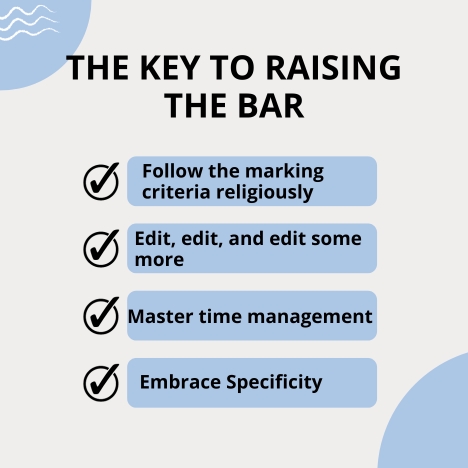Written by Dominic Giuliano
Good news, fellow students!
Not every university program out there demands stellar performance for admission, and you’re free to tailor your study journey as it best suits you.
But hold on a sec, because in some cases, meeting those minimum entry requirements could make or break your shot at getting into your dream program.
And guess what?
Sometimes just scraping by doesn’t cut it – the pressure is real, and you might find yourself yearning for those stellar grades. Future employers may also pay attention to how you went during your studies.
Don’t fret, though!
This post is your lifeline in the sea of academics, and we’ve got an exciting mix of tips and tricks to help you level up your grades and squeeze every ounce of goodness from your studies.
Whether you’re aiming for a competitive course or want to dazzle future employers with your results, there’s a little something here for everyone.
Let’s dive right in!

Top tips
Put Yourself in the marker’s Shoes:
Imagine being the marker, dealing with a stack of papers and tight deadlines. If your paper is a maze of confusion, your mark will reflect it.
Make your work crystal clear.
It can’t just be clear to you – your thoughts need to be understood by someone else for good communication to take place.
You can even use Word’s text-to-speech feature to listen to your paper, aiming for it to make sense to someone other than yourself.
The best test is having someone else read your work. Revise and ensure smooth readability with well-structured paragraphs and clear transitions.
Follow the marking criteria religiously:
Think of the marking criteria as the law that markers follow when grading your paper.
Familiarise yourself with it and stick to it closely. If something in the criteria confuses you, don’t hesitate to ask for clarification.
Be the diligent student who ensures everything is crystal clear.
Treat your study as if it were your job, and make it your business to know how your work will be assessed as though your income depends on it (maybe it will one day?)

Edit, edit, and edit Some More:
Editing is your best friend. The best advice (thanks to Professor Andrew McGrath) is to start each writing session by editing what you wrote in a previous session.
Before submitting, get someone else to proofread and accept their feedback with an open mind.
You can also seek help from academic tutors or skills advisors for professional feedback.
Your paper gets better when multiple people can understand your points.
Tip: Did you know that Charles Sturt University students can book a free 25-minute appointment with an Academic Skills Advisor, here.
Embrace specificity:
Vague writing often leaves markers scratching their heads. Don’t just make general points; use precise examples.
Specificity showcases your critical thinking and makes your paper stand out as unique, insightful, and well-written.
It demonstrates you can consider things from a macro and a micro perspective.
Master time management:
Time management is crucial. Divide your work into manageable chunks and save each revision as a separate document to track your progress.
Try to study in “mental sprints” rather than long hauls.
Research shows that focusing for 25 minute intervals and then taking 5-minute rests (known as the Pomodoro technique) can enhance mental focus, improve motivation, and allow your brain to process information more effectively.
The downtime between study sessions can include music or something enjoyable to keep you motivated.
**Bummer alert**
Studying with music (especially with lyrics) has been shown to impair information retention.
This may hinder performance in quizzes or oral assessments, where recall is needed.
Instead, neuroscience tells us that studying with so-called “brown noise” reduces external distractions and encourages deeper concentration.
Keep the fun stuff for the breaks in between.

Master the art of tentative writing:
Don’t be afraid to express uncertainty in your writing.
The world is full of unknowns, and acknowledging this demonstrates intellectual honesty.
If something is unclear, say so; if it’s clear, state it confidently. Your role is to report what you see to the best of your ability.
Become an APA Expert:
While you might already be familiar with APA style, did you know that the APA guide offers valuable tips for writing more clearly and concisely?
Master these tips, along with academic referencing, and you’ll collect those “low-hanging fruit” marks.
Remember, these tips and tricks are your secret weapons to succeed in your academic journey.
Use them wisely and watch your grades soar!
A final note from Dominic
I’m far from being an expert, and my academic journey has been anything but flawless.
Along the way, I’ve experienced the full spectrum of grades, from lows to highs, including a few fails and some glorious HD’s.
However, don’t let past setbacks make you believe that improvement is out of reach.
Embrace your mistakes and welcome constructive feedback with open arms. In the wise words of the Latin phrase, “ancora imparo” – I’m always learning.
Useful links
To book in with an academic skills adviser click here
To read about the Pomodoro Technique click here
To listen to Academic Brown Noise click here











